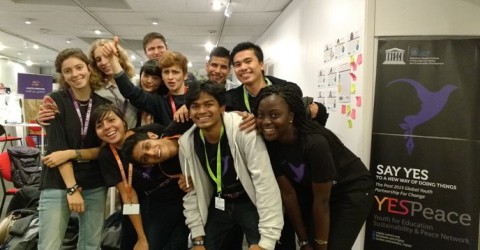
GCED Basic Search Form
Quick Search
Close
You are here
News
UNESCO’s YESPeace Network taps the power of youth worldwide to change the future
Post date:
2016/03/30

“We have to bring young people back into society and what they need is identity and meaning,” said Dr Anantha Kumar Duraiappah, Director of the UNESCO Mahatma Gandhi Institute of Education for Peace and Sustainable Development (MGIEP) in New Delhi.
MGIEP is UNESCO’s specialist institute on education for peace and sustainable development and named in tribute to the non-violent, sustainable living principles of Mahatma Gandhi.
Dr Duraiappah, who was interviewed after participating in a UNESCO experts’ consultation on preventing violent extremism through education, says the YESPeace Network is part of the institute’s response to just such challenges.
Unifying youth around peace and sustainable development
“Young people want a voice and they want dignity,” he said. “They live in an interconnected increasingly small world and they are surrounded by social media chatter. We want to build a platform that unifies them around our mandate of peace, sustainable development and global citizenship.”
The network is one element of the institute’s Youth Programme, which aims to empower young people through education to construct a peaceful and sustainable future. It brings them together to focus on the Sustainable Development Goals, and in particular SDG Target 4.7 which relates to Education for Sustainable Development (ESD) and which MGIEP has taken ownership of.
“We spoke to youth about the target and they told us it was fuzzy and didn’t mean much to them whereas real issues such as poverty, clean water, equal access to education and health did, so we took that on board,” he said.
In response MGIEP is developing a knowledge base from youth-led monitoring of Target 4.7 which includes a mobile app so that they can directly upload real life examples of behaviour change from the community in relation to ESD.
“We want to put youth in the driving seat to implement and monitor the SDGs,” he said.
No one size fits all’ solution
Dr Duraiappah says that young people are searching to believe in something and as a result some end up being influenced by extremists but cautions against a ‘one size fits all’ solution.
“We have to remember that what drives a young person in Afghanistan or in Syria is very different from what drives a young person in Canada or elsewhere,” he said.
“We want to show young people how to become global citizens, that multiple identities within society are to be embraced and that self-doubt is not a sign of weakness but a strength.”
Youth-led campaign on global citizenship
In addition to the YESPeace Network, MGIEP runs the Campus Ambassadors Programme which promotes intercultural dialogue and is developing the Changemakers Programme which focuses on training and leadership based on humane and compassionate values.
Each year the institute holds the event TAG 2016, Talking Across Generations, which in 2016 was devoted to Violent Extremism and Education and included a first time ever joint concert by Pakistan band Junoon and Indian band Indian Ocean. Coming up, a second major music concert with the two bands is planned for October 2 which is International Day of Non-violence and the birthday of Mahatma Gandhi.
URL:
http://en.unesco.org/news/unesco-s-yespeace-network-taps-power-youth-worldwide-change-future
